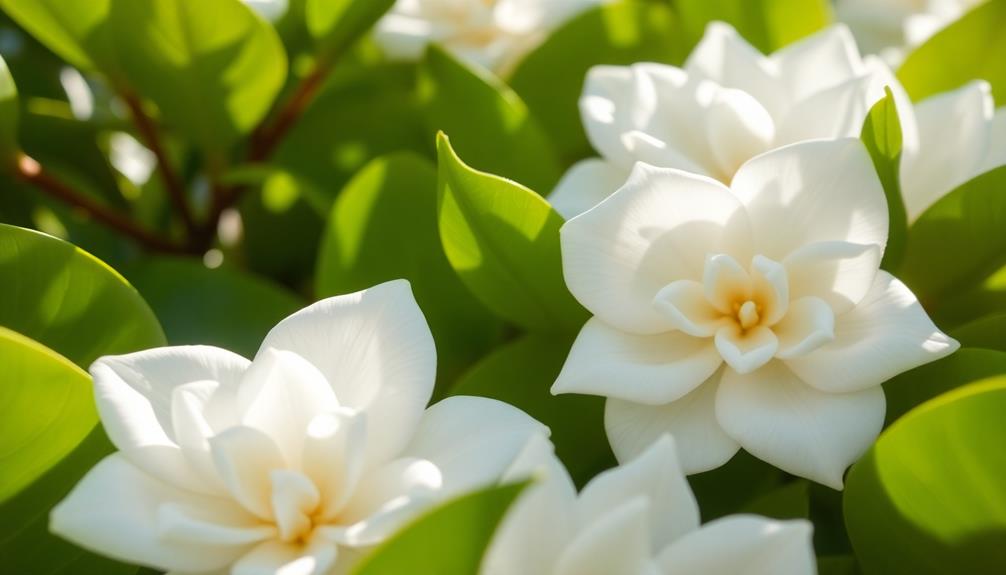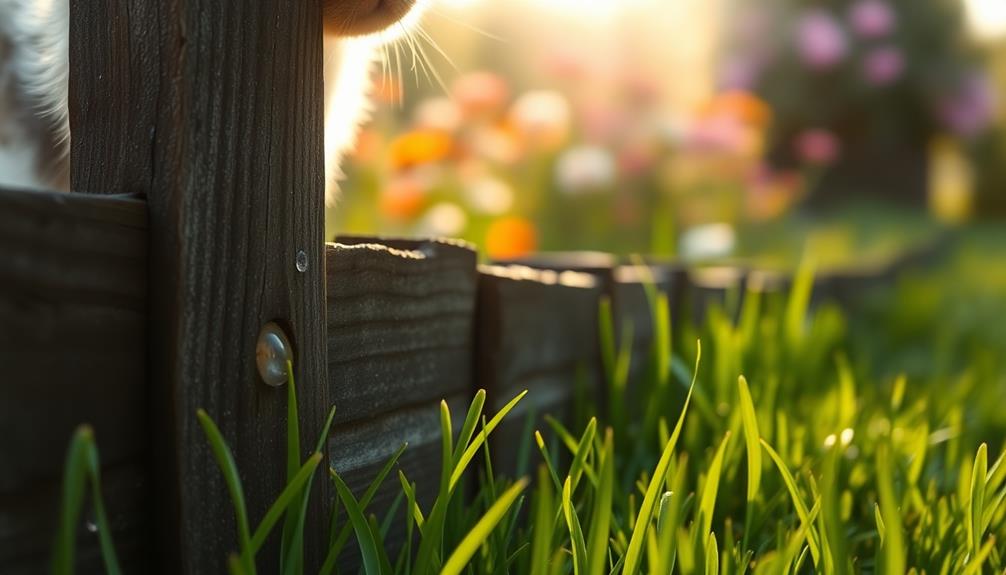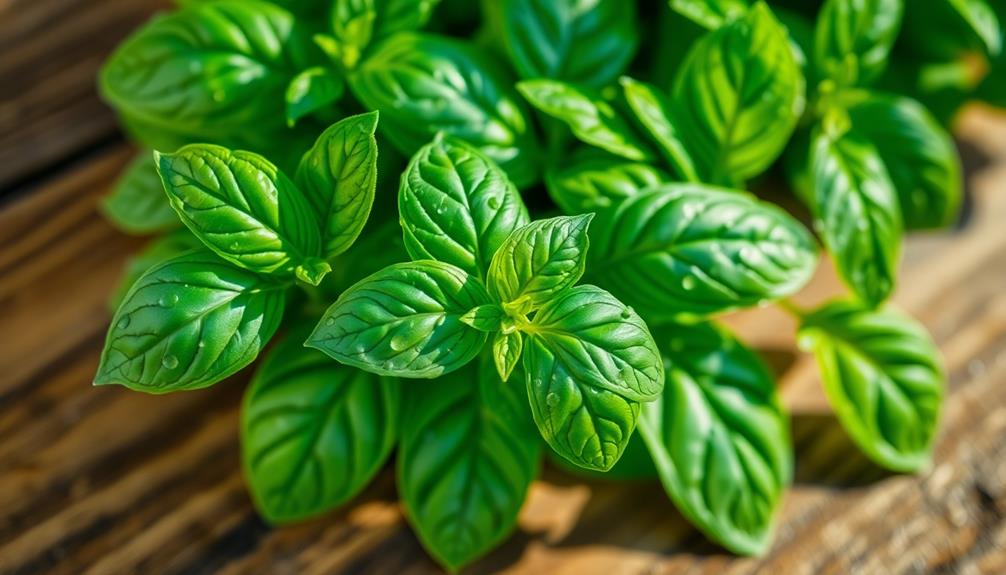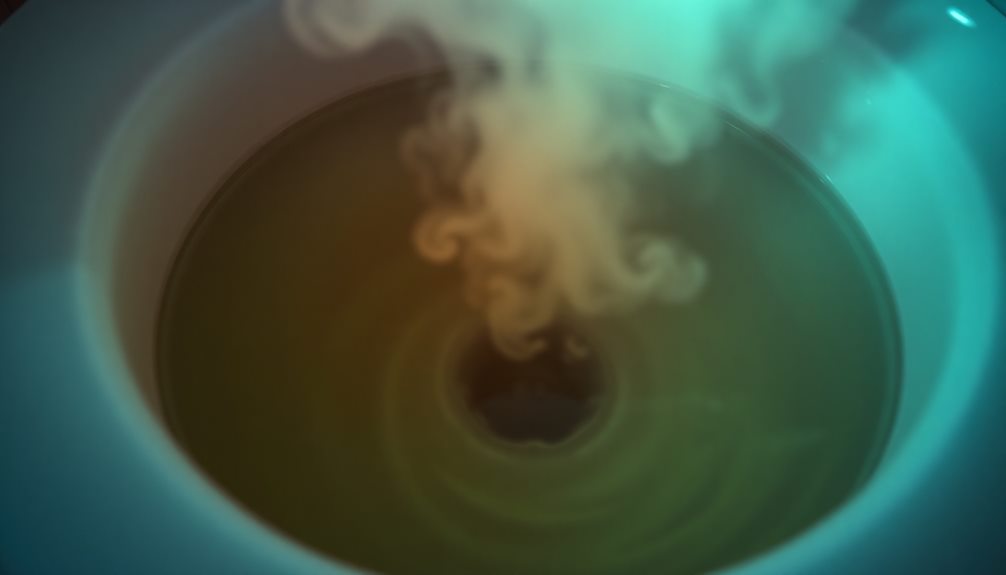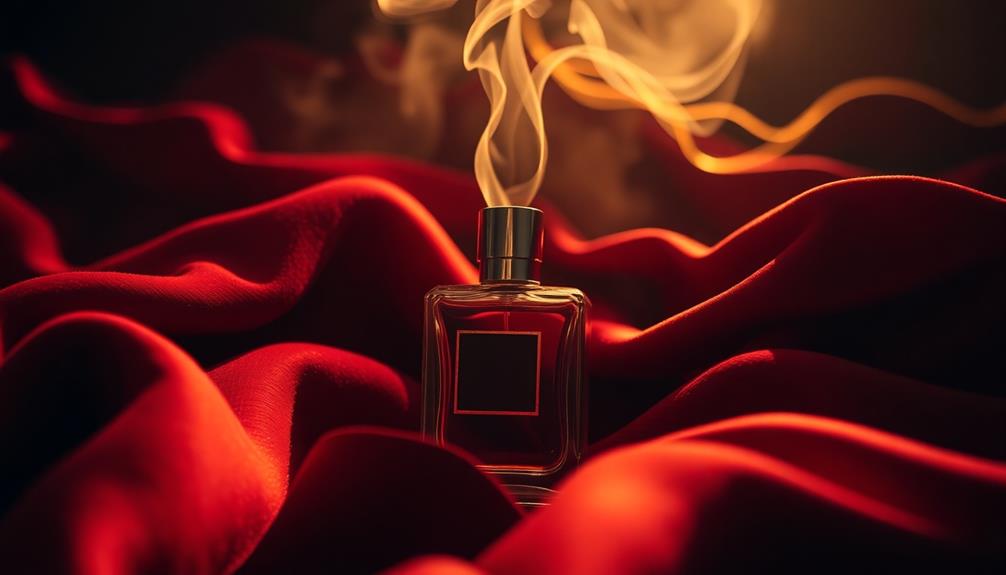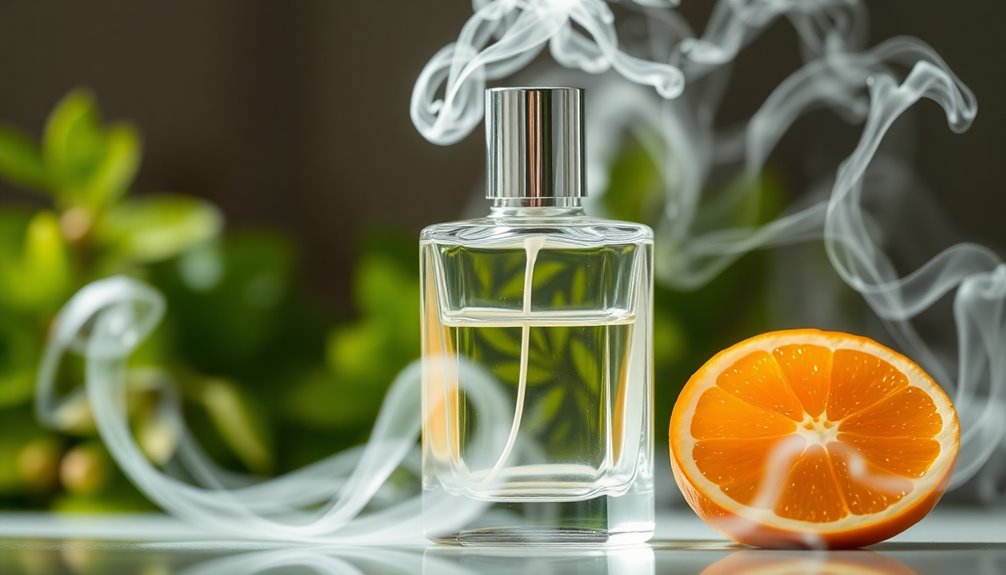Gardenias smell absolutely delightful! Their fragrance is rich and creamy, mixing sweet floral notes with hints of coconut and earthy undertones. It's a unique scent that becomes even more intense at night, making it perfect for evening gardens. You'll often find gardenia in perfumes like Gucci Flora and Chanel Gardenia, where it adds a charming touch. This captivating aroma can evoke feelings of love and nostalgia, often reminding you of warm summer nights. Just remember, if you're interested in using gardenia oils, testing it on your skin first is smart. There's so much more to explore about this enchanting flower! In addition to their mesmerizing fragrance, gardenias are often compared to other fragrant blooms, like freesia. If you’re curious about **what freesia flowers smell like**, imagine a lighter and more citrusy scent, with a fresh, almost peppery quality that’s equally enchanting. Pairing gardenia with freesia in a home garden or bouquet can create a stunning olfactory experience, blending their distinct yet harmonious notes perfectly.
Key Takeaways
- Gardenia has a strong floral aroma, characterized by rich, creamy, and sweet notes that create a luxurious experience.
- The scent includes hints of creamy coconut, spicy, and earthy elements, setting it apart from similar flowers.
- Key compounds like linalool and methyl benzoate contribute to its delightful fragrance profile.
- Often experienced more intensely at night, gardenia attracts nighttime pollinators with its captivating aroma.
- The scent evokes emotions of love, purity, and nostalgia, making it popular in perfumes and aromatherapy.
Introduction

When you think of gardenia, you might imagine a scent that's both intoxicating and inviting. This captivating fragrance, known for its rich and creamy floral notes, sets gardenias apart from other white flowers like jasmine and tuberose. The gardenia's aroma is often described as sultry and sweet, drawing you in with its unique blend of floral and fruity qualities.
The scent comes from special compounds that create its delightful fragrance. Linalool and methyl benzoate play key roles in making the gardenia's aroma so memorable.
At night, the fragrance intensifies, making it even more alluring to nighttime pollinators and enhancing its charm in gardens.
You might notice soft green and spicy undertones that add depth to the scent, while earthy notes keep it grounded. This captivating aroma appears in many popular perfumes, such as Gucci Flora and Chanel Gardenia, showcasing its versatility.
Description of the Smell
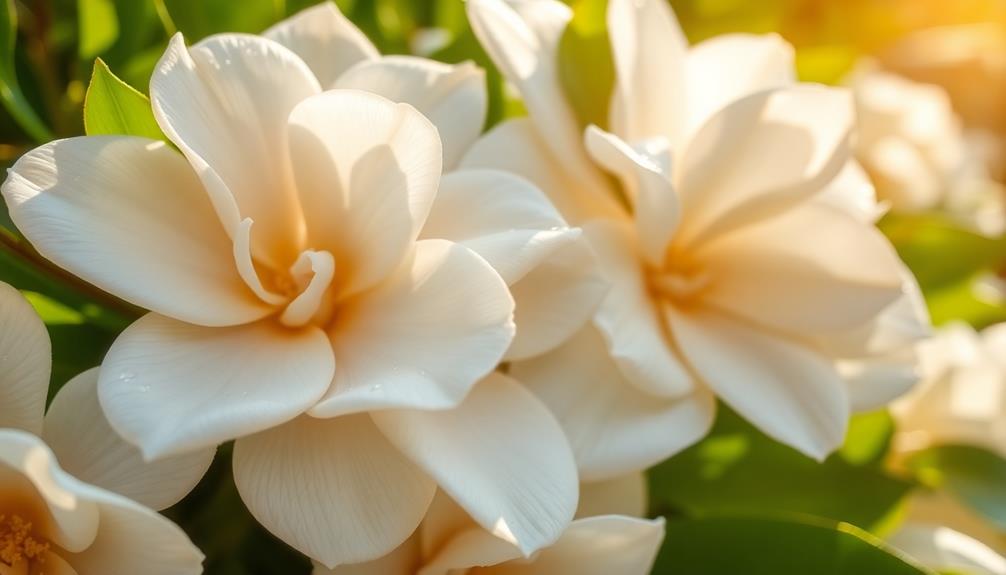
The smell of gardenia captivates the senses with its strong floral aroma that's both sweet and zesty. When you take a whiff, you're greeted by a rich and creamy fragrance that feels luxurious. This floral scent stands out among white florals like jasmine and tuberose, thanks to its unique scent profile. You might notice hints of creamy coconut that blend beautifully with spicy and earthy notes, creating a complex experience.
As the day turns to night, the gardenia smell intensifies, making it even more inviting and sultry. The essential oil extracted from gardenias captures this delightful aroma, which is often used in perfumes and other aromatic products. You may detect sweet and zesty undertones that linger in the air, making you feel a sense of warmth and comfort.
With compounds like linalool and methyl benzoate at play, the gardenia fragrance is both floral and creamy. This combination creates a scent that's not only sweet but also has an earthy depth, ensuring that each experience with gardenia is memorable and enchanting.
Source and Composition
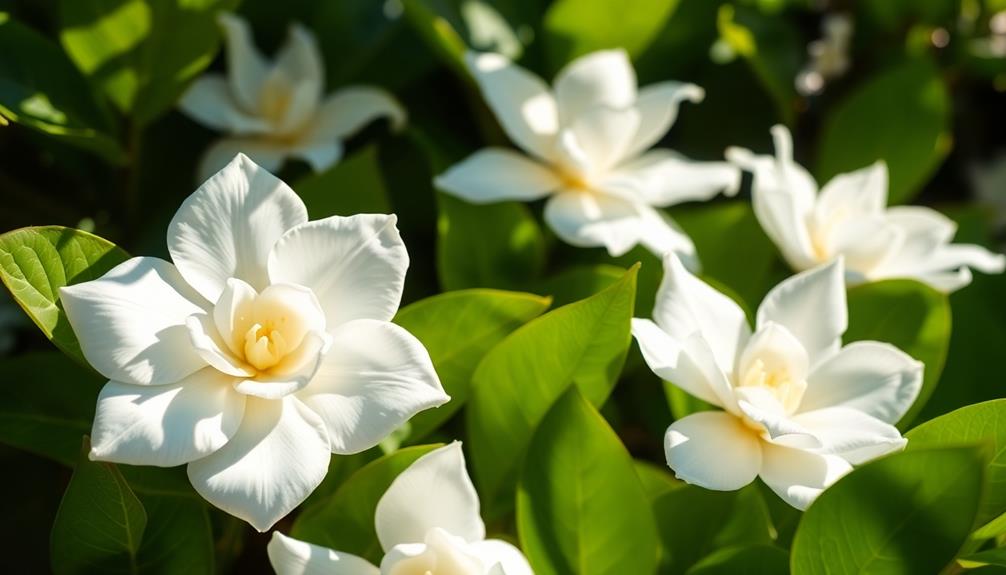
Gardenia's captivating aroma comes from a blend of specific compounds that create its unique scent profile. The scent of gardenia is a delightful mix of floral notes and creamy sweetness. One of the key players is linalool, which gives it that lovely white floral fragrance.
Another important compound is methyl benzoate, adding a sweet and creamy aroma that makes the gardenia smell so inviting. You might also find indole in the mix, which brings in earthy notes. However, in many fragrance formulations, they reduce indole to keep the scent sweeter and more appealing.
This richly floral aroma has fruity, sweet, and even soft green characteristics. Interestingly, the gardenia flower's fragrance intensifies at night, attracting nocturnal pollinators and setting it apart from other white florals.
Modern essential oil extraction methods have made it easier to capture this enchanting scent. Techniques like solvent extraction allow for the creation of gardenia absolutes, which are perfect for perfumery.
Typical Scenarios or Environments
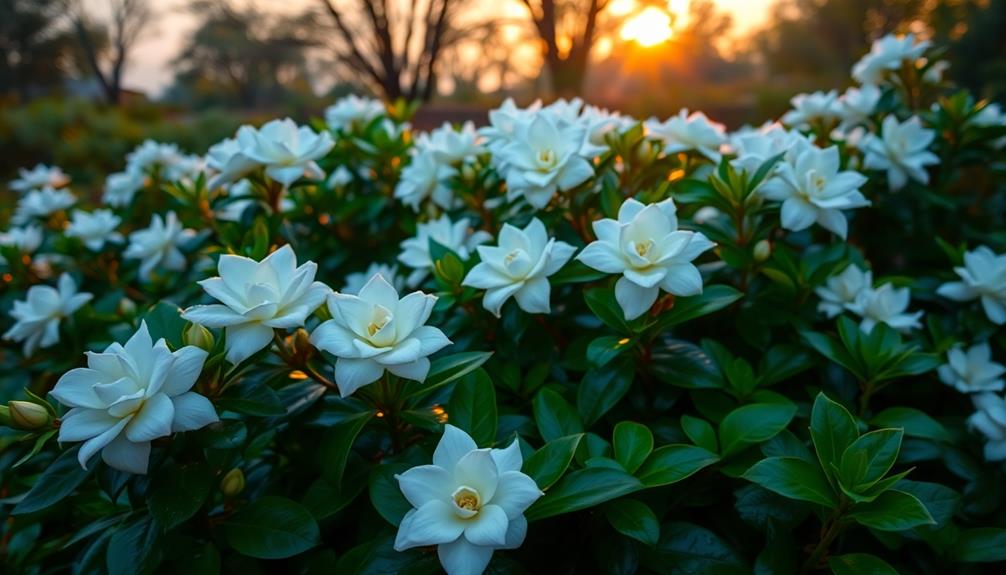
You'll often find gardenias flourishing in vibrant gardens or arranged beautifully in floral displays, particularly in warmer climates. Their strong floral scents fill the air, especially at night, when the gardenia scent becomes more pronounced. This sweet and zesty aroma attracts nocturnal pollinators, enhancing the beauty of evening gardens.
In traditional Southern gardens in the United States, gardenias symbolize charm and elegance, making them a popular choice for wedding bouquets. Their rich fragrance doesn't just smell delightful; it also contributes to a calming sensory experience. Many people use gardenia perfumes or candles in their homes, creating an inviting atmosphere that promotes relaxation.
Incorporating the freshness of gardenia into your space is easy. You can light a gardenia-scented candle while enjoying a peaceful evening or use essential oils for aromatherapy. This soothing aroma helps you unwind after a long day.
Imagine stepping into a room filled with the lovely gardenia smell, instantly feeling calm and refreshed. Whether in a garden or your living room, gardenias add a touch of elegance and make any environment feel special.
Emotional or Cultural Associations

When you catch a whiff of gardenia, it often stirs up feelings of love, purity, and nostalgia. This beautiful flower is more than just a pretty sight; its sweet fragrance has deep emotional and cultural meanings.
In many cultures, gardenias symbolize secret love, making them popular in weddings and romantic settings. You might find them tucked into bouquets, as their smell enhances the joy of special moments.
The captivating scent of gardenia can also bring back memories of summer nights spent in lush gardens, filling you with a sense of nostalgia.
In the language of flowers, gardenias represent joy and good fortune, making them a perfect gift for celebrations. Plus, their fragrance is often used in aromatherapy to promote relaxation and ease anxiety, adding to its calming effect.
Health or Safety Considerations

Considering the lovely scent of gardenia, it's important to be aware of potential health and safety concerns. While gardenia essential oil can enhance your space and mood, it can also cause skin irritation or allergic reactions in some people. To stay safe, always perform a patch test before applying it fully.
If you're using gardenia in aromatherapy or cooking, remember that ingesting it could lead to gastrointestinal disturbances, so follow the directions carefully. Additionally, the fragrance compounds like linalool and methyl benzoate can trigger asthma or respiratory issues, especially in sensitive individuals, when inhaled in concentrated forms.
If you're pregnant or breastfeeding, it's best to consult a healthcare professional before using gardenia products, as there isn't a lot of safety data available.
Also, ensure you have proper ventilation when using gardenia-scented candles or oils; this helps minimize any potential respiratory irritation.
Final Thoughts
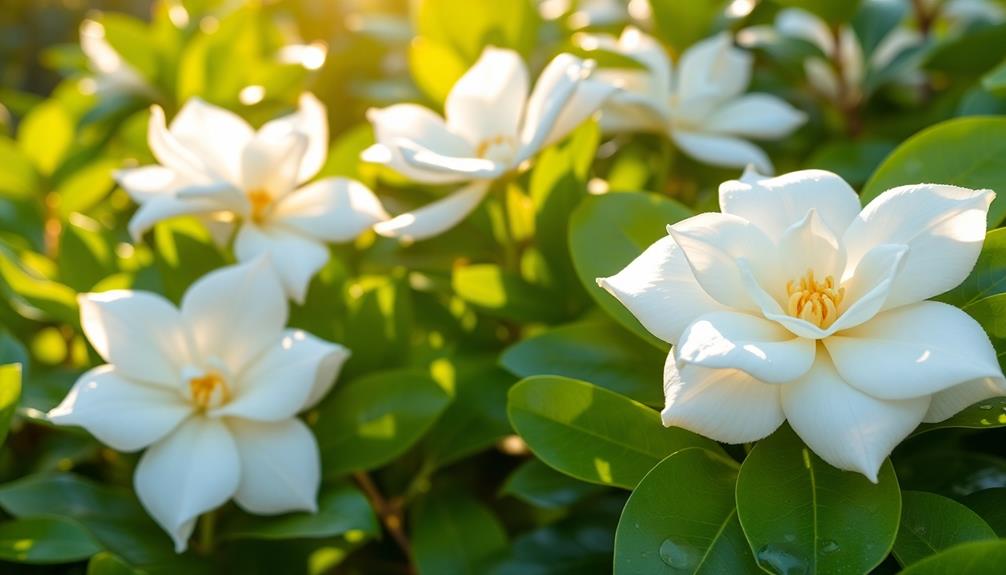
In summary, the enchanting scent of gardenia offers a delightful experience that appeals to many. Its strong floral aroma features sweet and zesty undertones that make it stand out among other flowers. When you breathe in the scent of gardenia, you may notice its creamy, earthy notes that come from compounds like linalool and methyl benzoate. These elements create a unique blend that differs from the fragrance of jasmine and tuberose.
Gardenia is often used as a top note in perfumes, enhancing the overall fragrance with its rich profile. It pairs beautifully with other white flowers and citrus notes, adding complexity to your favorite scents.
Plus, gardenias are a perfect choice for evening gardens, as their fragrance intensifies at night to attract nocturnal pollinators.
If you're looking to fill your space with a captivating aroma, consider incorporating gardenia into your life. Whether through fresh blooms or lovely perfumes, the sweet and earthy essence of gardenia will surely bring joy and elegance to your surroundings.
Enjoy exploring this magical floral aroma!
Frequently Asked Questions
How Would You Describe the Smell of Gardenia?
When you think about the smell of gardenia, you encounter a rich, floral aroma, combining sweet and zesty undertones. Its creamy, spicy scent evokes elegance, making it an enchanting choice for luxury fragrances.
Does Gardenia Perfume Smell Good?
Yes, you'll find gardenia perfume smells amazing! Its rich floral aroma, combined with sweet and zesty notes, creates a captivating fragrance that many adore. You'll appreciate its elegance and unique charm in any setting.
Does Jasmine Smell Like Gardenia?
Jasmine doesn't smell exactly like gardenia. While both share floral notes, jasmine's scent is more penetrating and fruity, whereas gardenia offers a creamier, richer aroma. You'll notice these distinct characteristics when you experience them.
What Flowers Smell Like Gardenia?
If you're exploring flowers that smell like gardenia, consider jasmine, tuberose, ylang ylang, magnolia, and frangipani. Each offers unique floral notes, but they share a sweetness and creaminess that you might enjoy.
